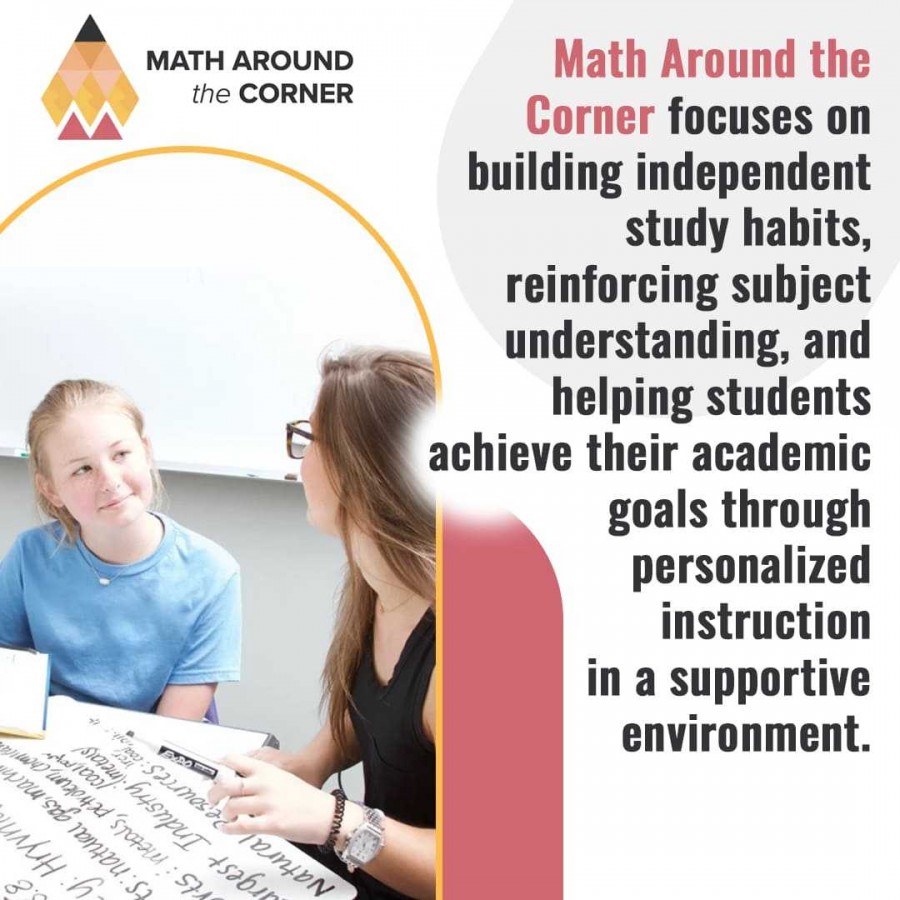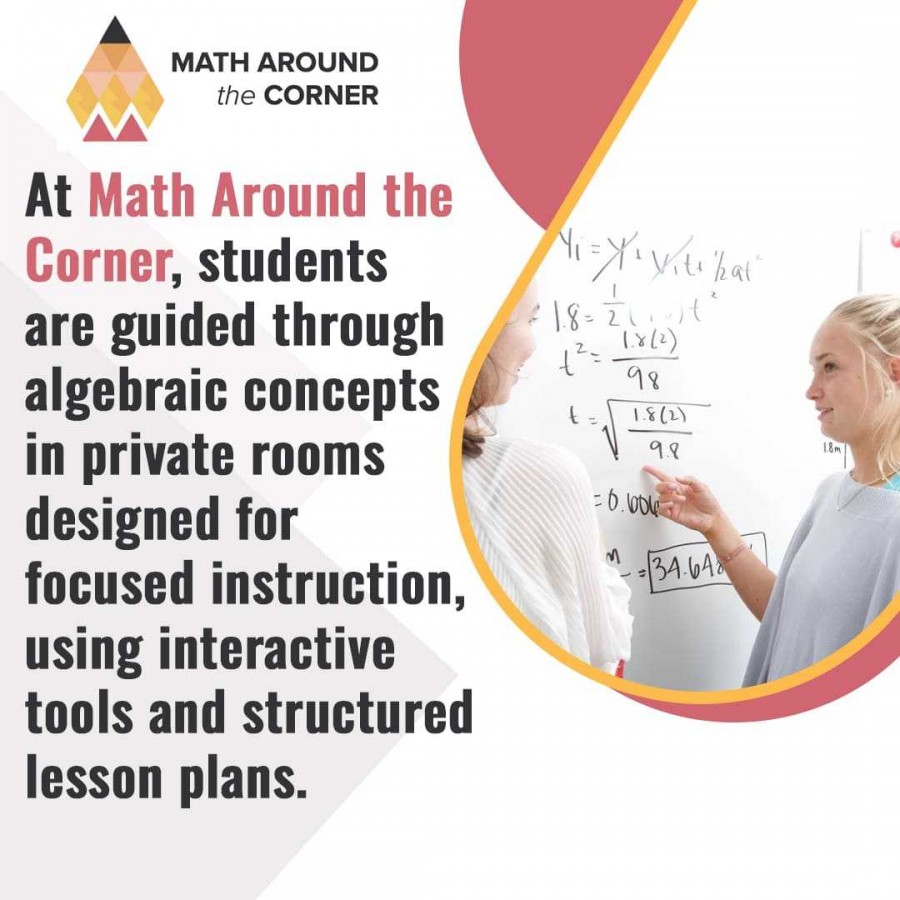Mastering Algebra: Common Mistakes and How to Avoid Them

Struggling with algebra is more common than most people think, but staying stuck doesn’t have to be. Six in ten children and adolescents worldwide are not achieving basic proficiency in reading and mathematics, highlighting just how widespread these challenges are. At Math Around the Corner here in Fort Worth, we work with students every day who feel overwhelmed by equations, variables, and rules that don’t seem to make sense at first. Our job is to turn that confusion into confidence through personalized algebra tutoring that meets every student exactly where they are. Whether your student is in middle school, high school, or college prep, our one-on-one tutoring provides the kind of algebra help that builds lasting skills. We believe that with the right guidance and tools, anyone can learn algebra fast.
Key Takeaways
Algebra mistakes are common but fixable with personalized support.
Most students struggle with sign errors, skipped steps, or order of operations. One-on-one algebra helps correct these mistakes and builds confidence.
Understanding core concepts leads to faster learning.
To learn algebra fast, students must master the fundamentals, like isolating variables and distributing correctly, before moving to more complex problems.
Personalized tutoring is more effective than one-size-fits-all methods.
Every student learns differently. At Math Around the Corner, we customize algebra tutoring sessions to each student’s pace, goals, and learning style.
Fixing mistakes requires self-awareness and reflection.
Keeping an error log, talking through problems, and reviewing missed questions helps students understand why they got it wrong and how to get it right next time.
Algebra builds long-term problem-solving skills.
Students who succeed in algebra are more prepared for higher-level math, better test scores, and stronger logical thinking in everyday life.
Why Algebra Trips Up So Many Students
Algebra challenges students because it marks a major shift in the way math is approached. It’s no longer just about numbers; it’s about relationships, logic, and abstract thinking. For many students, this transition comes at a time when they’re still mastering basic math skills, which can make algebra feel twice as hard. A simple error in understanding variables or how to solve equations can spiral into a lack of confidence in all future math courses.
We’ve found that one of the biggest factors in overcoming this hurdle is personalized attention. At Math Around the Corner, our algebra tutoring is designed to be flexible and engaging, meeting each student’s specific learning needs. We work step by step through the material, helping students see the connections between what they’re learning and how it applies to their everyday lives and future coursework. When students finally understand a concept that used to confuse them, it changes how they see math and themselves.

What Are the Most Common Math Mistakes in Algebra?
Only 26% of 8th graders in the United States were proficient in math in 2022, according to the National Assessment of Educational Progress. This means the vast majority of students enter algebra without a strong foundation, making personalized support more important than ever.
Many students make similar mistakes in algebra, and those errors often come from the same root causes: rushing, not fully understanding the rules, or skipping steps. Let’s take a closer look at four of the most frequent algebra mistakes we correct during tutoring sessions.
1. Misunderstanding the Order of Operations:
When students don't follow the correct sequence (Parentheses, Exponents, Multiplication/Division, Addition/Subtraction), they get incorrect answers. It’s a common pitfall, especially when problems look simple at first glance. We teach students to write out each step and use color-coded methods or mental cues to help them process the right order every time.
2. Sign Errors:
Algebra is full of positive and negative signs, and it’s easy to get them mixed up. Students might forget that subtracting a negative number is the same as adding a positive, or that multiplying two negatives gives a positive result. These mistakes can derail a correct solution, even if the rest of the math is sound.
3. Dropping Variables:
When solving equations, students sometimes isolate the number and forget to carry the variable through all the steps. For example, they might reduce 3x = 6 to just 6, completely forgetting to divide by 3 and solve for x. We encourage students to check each step against the original problem to avoid this.
4. Incorrect Distribution:
Distributing numbers across parentheses incorrectly is another widespread issue. A student might apply multiplication to the first number inside parentheses but forget the second. With our hands-on tutoring methods, including interactive whiteboards and real-time problem solving, students learn to distribute with confidence.
Correcting these common math mistakes builds a solid foundation for future success in algebra and beyond.
How Can Students Learn Algebra Fast?
Learning algebra quickly doesn't mean rushing through topics. Instead, it means building understanding efficiently and targeting the right areas for improvement. We’ve found that students can learn algebra fast when they’re taught in a way that makes sense to them personally. That’s where one-on-one tutoring makes a huge difference.
The secret is to focus on the core skills that unlock more complex concepts. For example, understanding how to isolate a variable or manipulate an equation paves the way for mastering word problems and quadratic functions. When students get comfortable with these basics, they’re better equipped to solve more advanced equations without fear.
At Math Around the Corner, we provide structured, customized plans that prioritize these fundamentals. Our tutors work in weekly sessions to support retention and build on previous lessons. We also use review checkpoints to reinforce concepts that might need extra attention.
Whether your student is preparing for a test, trying to catch up, or simply wants to feel more confident in class, our tutoring helps them reach their goals faster. And because we offer both in-person and virtual sessions, they can access help in a way that fits their schedule.
What Are the Best Techniques for Fixing Algebra Mistakes?
Fixing algebra mistakes isn’t just about getting the right answer; it’s about understanding where things went wrong and why. We focus heavily on metacognition, or “thinking about your thinking,” during our algebra tutoring. This helps students become aware of their patterns and gives them the tools to break bad habits.
One of our most effective strategies is encouraging students to keep an error log. Every time they make a mistake, we ask them to write it down and explain what caused the error. Was it a rushed decision? A sign they missed? A forgotten rule? This process turns every mistake into a learning opportunity and prevents repeated errors in the future.
Another method we teach is verbalization. By explaining their reasoning out loud, students can often catch errors before writing them down. It also helps our tutors hear exactly where the misunderstanding lies so that we can target that concept directly. Finally, we use spaced repetition, that is, going back to challenging problems after a few days, to reinforce long-term learning.
Through these techniques, students don’t just avoid mistakes; they learn from them. And that’s the kind of growth that lasts.
What Should You Ask If You're New to Algebra?
If your student is just starting algebra, you might not even know which questions to ask. But knowing the right questions can lead to faster understanding and better outcomes. Here are a few we recommend every parent and student explore:
What skills should I review before starting Algebra I?
How can I tell if I understand a topic or just memorized a formula?
What’s the best way to study for algebra quizzes and tests?
How do I use real-life examples to make algebra more meaningful?
We love these kinds of questions because they get to the heart of learning. Our tutors in Fort Worth are trained not just to deliver content, but to spark curiosity. When students understand why a rule works, they’re more likely to remember it and apply it correctly. This curiosity-driven approach makes algebra tutoring a richer, more enjoyable experience. And for students who may feel overwhelmed, starting with the right questions can make everything feel more manageable.
How Does Algebra Tutoring Work at Math Around the Corner?
Our algebra tutoring approach is all about personalization and comfort. We know every student learns differently, and we’ve created an environment that adapts to those needs. Whether your student needs to catch up, get ahead, or prepare for an important exam, we design every session to meet their goals.
Tutoring sessions are held in private rooms at our Mira Vista Commons location in Fort Worth. Each room features interactive whiteboards and a college-themed setup to inspire students and promote a sense of pride in their education. These rooms aren’t just quiet; they’re built for engagement, focus, and creativity.
Our tutors are experienced professionals who understand the subject matter and also know how to connect with students. We match students with tutors who suit their learning style and personality. And if your family prefers remote learning, we also offer virtual algebra tutoring with the same level of customization and care.
We believe tutoring should feel like a partnership. That’s why we communicate regularly with parents, provide progress updates, and even adjust our approach as students grow more confident. From day one, we’re on your team.
Can Algebra Help Improve Overall Math Skills?
Absolutely. Algebra isn’t just one step in a math curriculum; it’s the bridge to all advanced math. When students understand algebra, they unlock a new level of mathematical thinking that applies to geometry, trigonometry, calculus, and even data analysis.
Beyond school, algebra also builds practical problem-solving skills. It teaches students how to identify patterns, analyze situations, and make decisions based on logical steps. These abilities translate to everything from budgeting money to planning college courses.
We remind our students that algebra isn’t just about passing a test. It’s about developing confidence in their reasoning skills. When we show students how to apply algebra in real life, whether it’s calculating grades, interpreting graphs, or adjusting a recipe, they begin to appreciate its value. That’s when real learning takes place.
What If My Child Hates Math?
We hear this often. But in most cases, the issue isn’t the subject; it’s the experience. Students who say they “hate” math are usually expressing frustration, embarrassment, or confusion. That’s why our first job as tutors is to rebuild their confidence.
We do this by creating a positive, welcoming space where questions are encouraged and mistakes are seen as part of the process. Our tutors celebrate progress and tailor their teaching style to match each student’s pace. We also set small, achievable goals so students can see their growth in real time.
When students feel supported and understood, their attitude toward math shifts. Suddenly, what felt impossible becomes manageable. And over time, many students who once dreaded math become some of our most enthusiastic learners. That transformation is why we do what we do.
Frequently Asked Questions
How can I help my child learn algebra fast?
Start with a strong foundation and partner with a qualified tutor. At Math Around the Corner in Fort Worth, we offer one-on-one sessions designed to help students learn algebra fast by focusing on personalized strategies and skill-building.
At what age or grade should students start getting algebra help?
Algebra help is beneficial as early as 6th or 7th grade, especially when students begin pre-algebra. Math Around the Corner supports students from middle school through high school and beyond with customized tutoring plans.
My child says they “hate math.” Can tutoring change that?
Yes. Most students dislike math because they feel lost. At Math Around the Corner, we focus on building confidence through supportive tutoring that makes algebra feel approachable and even enjoyable.
What’s different about your algebra tutoring approach?
Math Around the Corner offers one-on-one tutoring in private, themed rooms that are designed to inspire and focus students. Our tutors use interactive tools to explain concepts clearly and help students learn algebra fast without stress.
Do you offer virtual algebra help?
Absolutely. In addition to our in-person sessions at our Fort Worth campus, Math Around the Corner provides virtual algebra help for families who prefer or need remote support. Both options offer the same personalized attention and results.

Get Algebra Help Today in Fort Worth
If your student is struggling with algebra or wants to move ahead with more confidence, Math Around the Corner is here to provide the much-needed algebra help. Our personalized tutoring approach, experienced team, and unique learning environment make us a trusted choice for families in Fort Worth and nearby areas.
Call us at (817) 720-6284 or email us at hello@matharoundthecorner.com to schedule your student’s first session.
We offer:
One-on-one tutoring in private, interactive rooms
Support for middle school, high school, and college-bound students
Tutors who care deeply about academic and emotional growth
Virtual and in-person options tailored to your schedule
Let’s help your student master algebra and take pride in their progress. AtMath Around the Corner, success is just around the corner.
